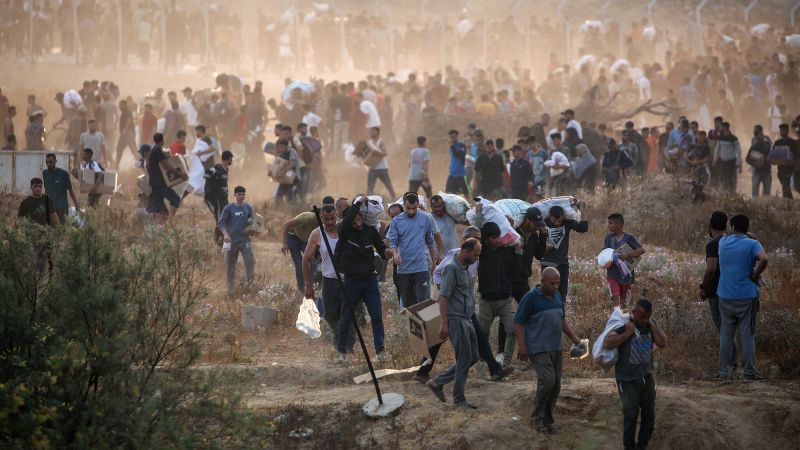CNN
—
The foreign ministers of 25 Western nations have slammed Israel for “drip feeding” aid into the Gaza Strip, as the health ministry in the territory said that more than 1,000 people have been killed seeking humanitarian relief there since late May.
The Palestinian health ministry did not specify the location of the deaths, but according to the United Nations, most casualties occurred while people were making their way to aid distribution sites operated by the controversial Israeli- and US-backed Gaza Humanitarian Foundation (GHF), which began operating on May 27.
Palestinian officials and witnesses have said the Israeli military is responsible for most of those deaths.
The Israel Defense Forces (IDF) has acknowledged firing warning shots toward crowds in some instances, and denied responsibility for other incidents. In late June, the military said it had “reorganized” the approach routes to aid sites to minimize “friction with the population,” but the killings have continued.
In their Monday statement, the Western foreign ministers said that “the suffering of civilians in Gaza has reached new depths.”
“The Israeli government’s aid delivery model is dangerous, fuels instability and deprives Gazans of human dignity. We condemn the drip feeding of aid and the inhumane killing of civilians, including children, seeking to meet their most basic needs of water and food,” they said.
The foreign ministers of Australia, Austria, Belgium, Canada, Denmark, Estonia, Finland, France, Iceland, Ireland, Italy, Japan, Latvia, Lithuania, Luxembourg, the Netherlands, New Zealand, Norway, Poland, Portugal, Slovenia, Spain, Sweden, Switzerland and the United Kingdom signed the statement, alongside the European Union’s commissioner for Equality, Preparedness and Crisis Management.
According to the health ministry in Gaza, 99 people were killed and at least 650 were injured while attempting to get aid in the last 24 hours.
A total of 1,021 people have been killed and 6,511 wounded seeking supplies since late May, the ministry said, adding that the total death toll since the war began is now at 59,029.
Between March 2 and May 21, Israel imposed an 11-week blockade on aid to the Gaza Strip, and UN agencies have since sounded the alarm about growing levels of starvation and malnutrition in the territory.
Aid organizations are still mostly restricted from entering the enclave, with Israel claiming that it is doing this to prevent Hamas from stealing supplies.
The foreign ministers said it was “horrifying” that so many Palestinians have been killed while seeking aid.
“The Israeli government’s denial of essential humanitarian assistance to the civilian population is unacceptable. Israel must comply with its obligations under international humanitarian law,” they said.
They urged the Israeli government to immediately lift its restrictions on aid into Gaza and allow humanitarian organizations, including the UN, to carry out work there “safely and effectively.”
In a post on X, Israel’s foreign ministry said that it “rejects” the statement published by the 25 nations, calling it “disconnected from reality” and adding that it “sends the wrong message to Hamas.”
“The statement fails to focus the pressure on Hamas and fails to recognize Hamas’ role and responsibility for the situation. Hamas is the sole party responsible for the continuation of the war and the suffering on both sides,” the Israeli statement said.
The Western criticisms of Israel come amid a tense wait for Hamas’ leaders in Gaza to respond to the latest ceasefire and hostage release proposal.
After successfully pressuring Israel last week to drop its objections to withdrawing its troops from a southern corridor in Gaza, the US has now communicated to Hamas that it is running out of patience and that the group must soon provide an answer to the latest framework for a ceasefire and hostage release deal, two sources familiar with the negotiations told CNN. Mediators submitted the proposal to Hamas nearly a week ago.
Hamas’ Qatar-based leader, Khalil al-Hayya, has indicated privately that he supports the latest framework, the sources said, but has said he is waiting for the approval of Hamas’ leadership inside Gaza, which will be responsible for implementing any deal.
Hamas spokesman Basem Naim denied that Hayya has said he supports the latest proposal and said Hamas was conducting “internal consultations” before responding.
The US has provided assurances that Israel will negotiate an end to the war during the proposed 60-day ceasefire. One of the sources said the US could withdraw those assurances if Hamas doesn’t quickly agree to a deal.
Both sources said the US, Qatar and Egypt are now bringing heavy pressure on Hamas to reach a deal.
“We don’t have time,” one of the sources said, pointing to the high daily death toll in Gaza and deteriorating humanitarian conditions.
While the pressure and frustrations are now focused on Hamas, people involved in the talks said it was Israeli intransigence – in particular over withdrawal maps – that had previously held up progress toward a deal.
Multiple officials involved in the talks said a deal could be reached this week if Hamas’ leaders in Gaza agree to the latest framework.
One official with knowledge of the negotiations said the mediators are increasingly optimistic that a deal can be reached after several major sticking points to an agreement were resolved last week.
The progress on the remaining gaps came after US President Donald Trump met the Qatari prime minister in Washington last week, which the official credited with hastening the process of resolving those remaining sticking points: namely, a map delineating Israeli troop withdrawals and assurances about negotiating a permanent end of the war during the 60-day ceasefire.

